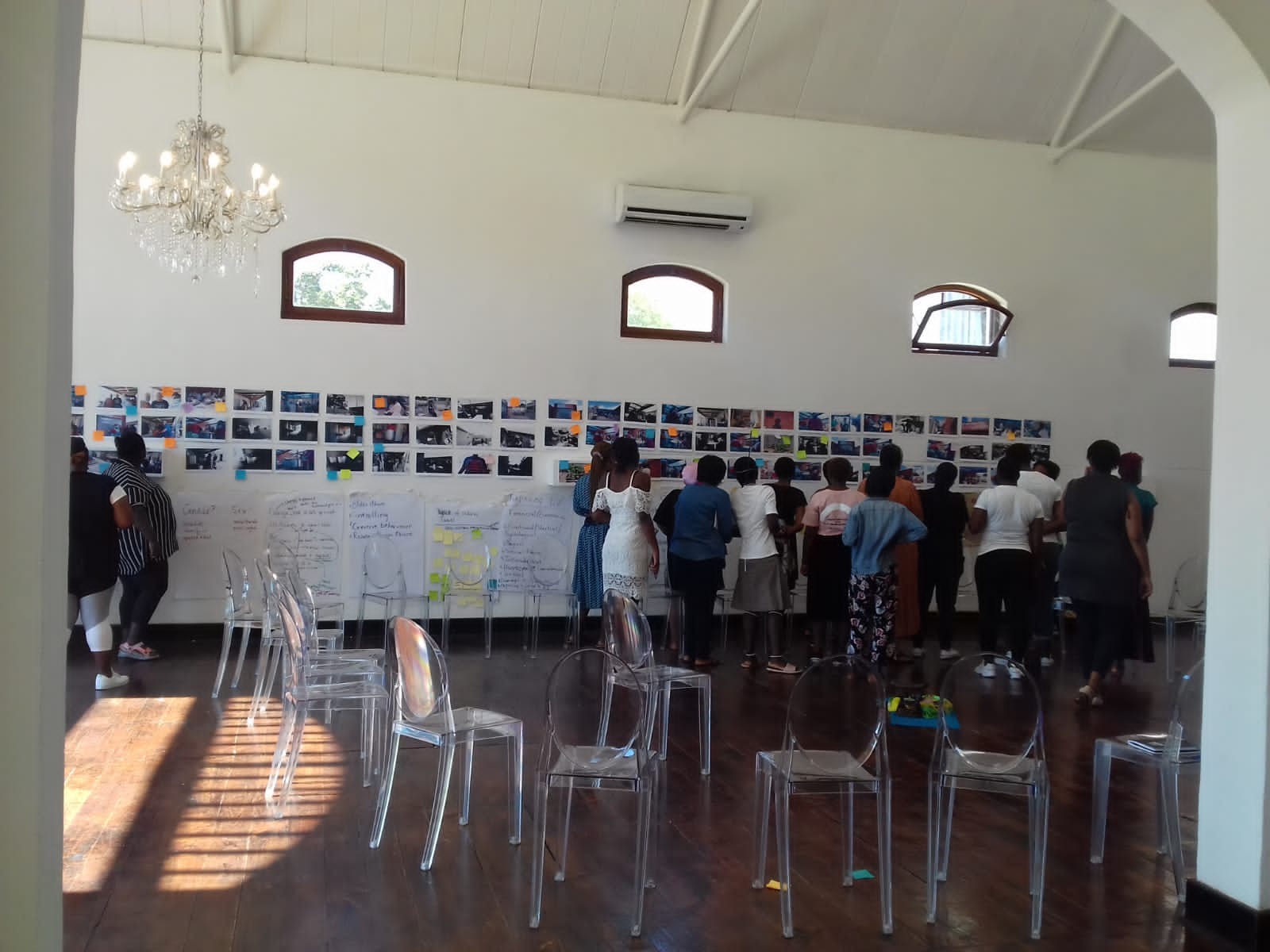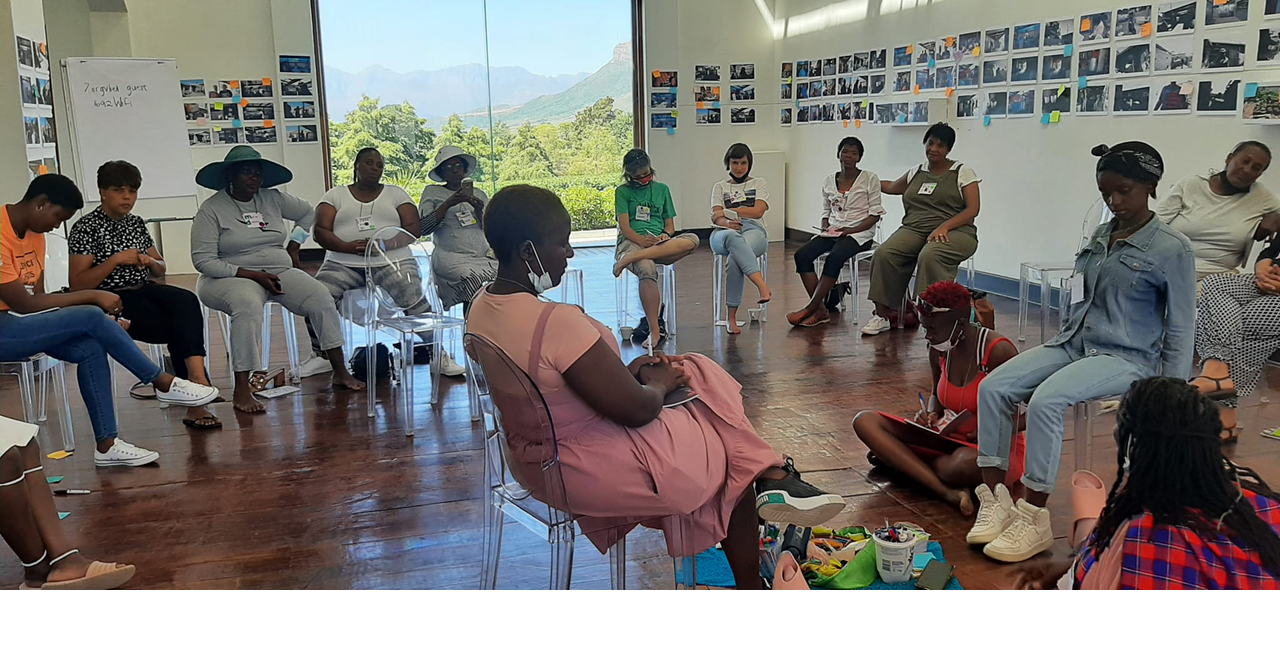Empowered women: Re-imagining food and community in Cape Town
Project partners meet some women using community kitchens to drive social transformation in Cape Town's informal settlements.
by Victoria Redmond and Nicole Paganini | 2022-03-07

In early March, project teams from the Urban Food Futures programme gathered in Cape Town for a vibrant one-week workshop to reflect on the findings of the scoping phase and formulate action-research priorities.
One of the core objectives of the partner exchange was to better understand what we do and why we do it. The workshop therefore started by juxtaposing the challenges of the past, present, and future of urban centres in Africa with the lived realities of urban dwellers.
Using a feminist lens to understood food insecurity and exclusion
Previous collaborative research exploring the impact of Covid-19 on household food security in different neighborhoods of the Cape Flats in Cape Town found that household food insecurity and the roles women play in food systems "are significantly shaped by intersectionality: the consequences of being women, Black or Persons of Color, residents of geographies of social and economic marginalisation within the city, and historically excluded from higher education.”
At the same time the pandemic stimulated community solidarity, with growing calls for an overhaul of the existing commercialised food system toward community-led solutions such as food dialogues and community kitchens.
TMG Research with partner organisations apply feminist approaches in food security research to unearth the root causes of broken systems and power struggles and amplify marginalised voices normally excluded in mainstream food research. Conventional food security research is often limited by its short-term focus on responding to shocks while ignoring the root causes and underlying fault lines in hunger. A feminist and participatory approach does not ignore perceptions, voices, and feelings of marginalised groups.
Through various site visits, Photovoice methodology, and two triangulation workshops, women speak about limitations in governance monitoring which tracks food insecurity while neglecting to ask why people are food insecure.
Photovoice: The power of "a face"


Seeing the human stories behind the numerical figure speaks to what it means to be hungry and stimulates exploration of these dimensions through qualitative methodology or mixed-methods.
Photovoice is a participatory method on co-creating knowledge through collective introspection and reflective dialogues. Photography as a mirror for communities to reflect on the everyday. Capturing moments and situations in photographs holds them for eternity. Although smartphones snap thousands of pictures daily, a picture taken to tell a message remains a contemporary medium. What may seem ordinary, mundane, or unimportant to the photographer nevertheless reflects day-to-day life challenges, the political environment, and the geographical space.
During the partner workshop, participants were able to meet, and learn from, some of the faces of Cape Town's community kitchens.
Gogo & Pam
With the outbreak of COVID-19 and the associated strict lockdowns that followed, food access became even more difficult for many families in Cape Town. Seeing this, Gogo was one of the many living in the townships who, along with her daughter Pam, opened her home and set up a community kitchen to centrally source and cook food for those most in need. Over the last two years, they have worked tirelessly and opened 20 community kitchens which they coordinate with about 80 volunteers in their area, feeding 3000 people per day.
Mama Hazel
Mama Hazel is a founder of a community kitchen too. She also has a small plot of land from which she sources some fresh food directly that not only helps her make healthy meals but she also uses as a tool to educate those who come to her kitchen and others running kitchens on nutrition and balanced meals.

Hazel Nyaba (left), Robert Dlokolo (middle), and Maria Dlokolo 'Gogo' (right) in front of Gogo's kitchen.
In the community kitchens the day starts at 3 am to 4 am with preparations for breakfast, then continues with coordination of the sourcing of basic ingredients and preparation of the main meal. Towards the evening activities focus on a community/social support system to help those most in need to find shelter for the night and provide a safe space for those facing intimate partner and gender-based violence.
Caroline
Caroline founded the Callas Foundation, an organisation which provides legal and moral support to women who experience domestic violence. Together with her team, Caroline rebuilt her own house to a shelter for women who experienced rape or gender-based violence. The ‘Callas ladies’ also run a community kitchen and plate for hundreds of people every day. Besides grocery shopping, cooking, dishwashing and organising, this also means a lot of fundraising and networking in their own neighbourhood, but also with various donors, to have enough food to be able to cook every day.
Our partner organisation FACT (Food Agency Cape Town) coordinates research with community kitchen leads in the townships. In their presentation at the workshop they posed a number of questions, such as:
How can we equip communities to use the data we gather through co-research and enter governance spaces?
How do we translate the learning, and findings from the ground to the bigger topics and what does theory mean to those who work on the ground?
A lot of food for thought as we move out of the scoping phase of the Urban Food Futures programme into the next phase of co-research.
 Urban Food FuturesFeb 09, 2026
Urban Food FuturesFeb 09, 2026Pushing the horizon: Urban farming and community-led innovation in Mukuru informal settlement
A small community-run greenhouse in Mukuru is offering insights into how controlled-environment agriculture can strengthen food security in urban environments under increasing pressure—and a look into the future of food systems in informal settlements.
Christian Sonntag, Emmanuel Atamba, Lumi Youm
 Land GovernanceDec 18, 2025
Land GovernanceDec 18, 2025Land tenure, women’s land rights, and resilience: Reflections from CRIC23 toward UNCCD COP17
Our experts discuss what the exchanges at CRIC23 highlighted and revealed about the role of secure and gender-equitable land tenure in the UNCCD's work ahead of the 2026 triple COP year.
Frederike Klümper, Washe Kazungu
 Urban Food FuturesDec 09, 2025
Urban Food FuturesDec 09, 2025The story of Mukuru's Urban Nutrition Hub
In Mukuru informal settlement, a safe haven for women has grown into the Urban Nutrition Hub, a multi-purpose space for nutrition education, training, and community development, demonstrating the potential of grassroots community-owned innovation..
Serah Kiragu-Wissler
Written by Victoria Redmond and Nicole Paganini


